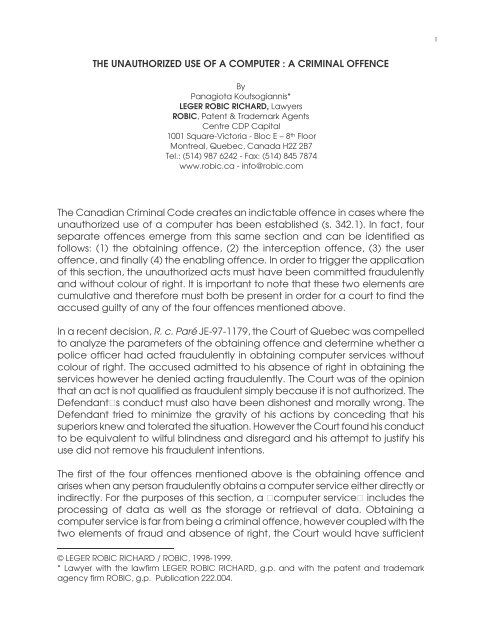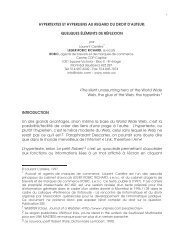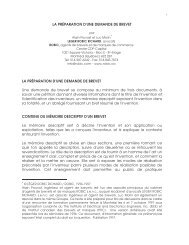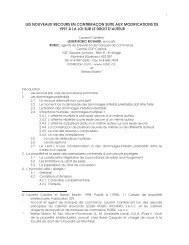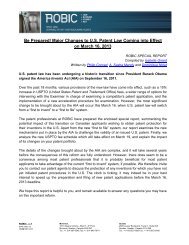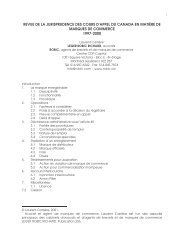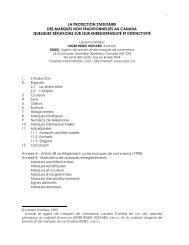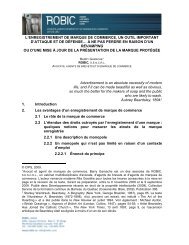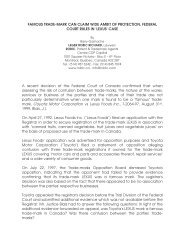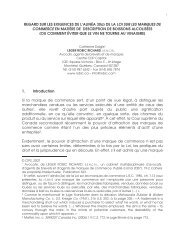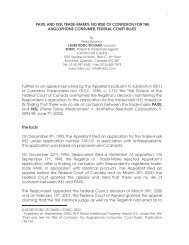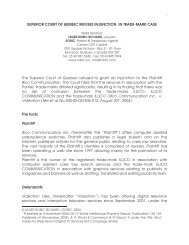THE UNAUTHORIZED USE OF A COMPUTER - Léger Robic Richard
THE UNAUTHORIZED USE OF A COMPUTER - Léger Robic Richard
THE UNAUTHORIZED USE OF A COMPUTER - Léger Robic Richard
Create successful ePaper yourself
Turn your PDF publications into a flip-book with our unique Google optimized e-Paper software.
<strong>THE</strong> <strong>UNAUTHORIZED</strong> <strong>USE</strong> <strong>OF</strong> A <strong>COMPUTER</strong> : A CRIMINAL <strong>OF</strong>FENCE<br />
By<br />
Panagiota Koutsogiannis*<br />
LEGER ROBIC RICHARD, Lawyers<br />
ROBIC, Patent & Trademark Agents<br />
Centre CDP Capital<br />
1001 Square-Victoria - Bloc E – 8 th Floor<br />
Montreal, Quebec, Canada H2Z 2B7<br />
Tel.: (514) 987 6242 - Fax: (514) 845 7874<br />
www.robic.ca - info@robic.com<br />
The Canadian Criminal Code creates an indictable offence in cases where the<br />
unauthorized use of a computer has been established (s. 342.1). In fact, four<br />
separate offences emerge from this same section and can be identified as<br />
follows: (1) the obtaining offence, (2) the interception offence, (3) the user<br />
offence, and finally (4) the enabling offence. In order to trigger the application<br />
of this section, the unauthorized acts must have been committed fraudulently<br />
and without colour of right. It is important to note that these two elements are<br />
cumulative and therefore must both be present in order for a court to find the<br />
accused guilty of any of the four offences mentioned above.<br />
In a recent decision, R. c. Paré JE-97-1179, the Court of Quebec was compelled<br />
to analyze the parameters of the obtaining offence and determine whether a<br />
police officer had acted fraudulently in obtaining computer services without<br />
colour of right. The accused admitted to his absence of right in obtaining the<br />
services however he denied acting fraudulently. The Court was of the opinion<br />
that an act is not qualified as fraudulent simply because it is not authorized. The<br />
Defendant s conduct must also have been dishonest and morally wrong. The<br />
Defendant tried to minimize the gravity of his actions by conceding that his<br />
superiors knew and tolerated the situation. However the Court found his conduct<br />
to be equivalent to wilful blindness and disregard and his attempt to justify his<br />
use did not remove his fraudulent intentions.<br />
The first of the four offences mentioned above is the obtaining offence and<br />
arises when any person fraudulently obtains a computer service either directly or<br />
indirectly. For the purposes of this section, a computer service includes the<br />
processing of data as well as the storage or retrieval of data. Obtaining a<br />
computer service is far from being a criminal offence, however coupled with the<br />
two elements of fraud and absence of right, the Court would have sufficient<br />
<br />
© LEGER ROBIC RICHARD / ROBIC, 1998-1999.<br />
* Lawyer with the lawfirm LEGER ROBIC RICHARD, g.p. and with the patent and trademark<br />
agency firm ROBIC, g.p. Publication 222.004.
evidence to convict if it was convinced of the evidence against the Defendant<br />
beyond a reasonable doubt. Today with the evergrowing presence of the<br />
Internet worldwide, a more accurate and complete definition of a computer<br />
service should perhaps include the external transmission or reception of<br />
information as a means of telecommunication.<br />
The second offence created by s. 342.1 of the Canadian Criminal Code is the<br />
interception offence and will be set off by any person who intercepts or causes<br />
to be intercepted, directlly or indirectly, any function of a computer system. The<br />
list of devices capable of causing the interception is not exhaustive and may<br />
include any contrivance which may be used to intercept any function of a<br />
computer system. However, a hearing aid used to correct subnormal hearing of<br />
the user to not better than normal hearing is specifically excluded from the<br />
various possible methods of interception provided for by this section of the<br />
Criminal Code. A computer system as used in this section can be defined as<br />
a device or a group of interconnected or related devices that (1) contain<br />
computer programs or other data or (2) perform logic and control, and may<br />
perform any other function pursuant to computer programs.<br />
The user offence is committed when someone uses or causes to be used, directly<br />
or indirectly, a computer system with the intent to commit an offence such as<br />
the obtaining or interception offences, as described above, or mischief in<br />
relation to data or a computer system (s. 430). The burden of proof lies with the<br />
plaintiff to show that all the elements required for the commission of the<br />
prohibited act were present. The Plaintiff must first prove the physical act of using<br />
a computer system, whether directly or indirectly. Furthermore, the Plaintiff must<br />
also show that the act was committed fraudulently and without colour of right.<br />
Evidence of these elements is still insufficient to impose criminal liability on the<br />
accused. For this offence, an additional mental element must also be proven;<br />
the Plaintiff must prove the Defendant s intent to commit either the obtaining or<br />
interception offence or mischief in relation to data or a computer system.<br />
The offence of mischief in relation to data, although not one of the four offences<br />
dealt with in the present article, is directlly linked to the provision on the<br />
unauthorized use of a computer. For the purposes of both sections 342.1 and 430<br />
(1.1) of the Criminal Code, data is defined as a representation of information or<br />
of concepts that are being or have been prepared in a form suitable for use in a<br />
computer system. When a person wilfully destroys, alters, renders ineffective or<br />
interferes with the lawful use of data, he is committing the offence of mischief,<br />
however, when a computer is used fraudulently with the intent of committing<br />
these mischievous acts, the user offence is also said to have been committed.<br />
The fourth and final offence created by s. 342.1 is the enabling offence. This<br />
offence will have been committed if a person used, possessed, trafficked in or
permitted another person to have access to a computer password that would<br />
enable a person to commit one of the three offences described above. A<br />
computer password allows a computer system or service to be obtained or used<br />
by keying in certain data.<br />
Although the Courts have had to deal very little with the offences foreseen in<br />
section 342.1, it might be warranted to assume that with the rapidity at which the<br />
Internet has been expanding in every part of the world, in businesses as well as<br />
in homes, it will create more possibilities for wrongdoing with respect to<br />
computers and will perhaps broaden the scope of situations to which this section<br />
can be applied.
ROBIC, un groupe d'avocats et d'agents de brevets et de marques de commerce voué depuis<br />
1892 à la protection et à la valorisation de la propriété intellectuelle dans tous les domaines:<br />
brevets, dessins industriels et modèles utilitaires; marques de commerce, marques de certification<br />
et appellations d'origine; droits d'auteur, propriété littéraire et artistique, droits voisins et de l'artiste<br />
interprète; informatique, logiciels et circuits intégrés; biotechnologies, pharmaceutiques et<br />
obtentions végétales; secrets de commerce, know-how et concurrence; licences, franchises et<br />
transferts de technologies; commerce électronique, distribution et droit des affaires; marquage,<br />
publicité et étiquetage; poursuite, litige et arbitrage; vérification diligente et audit; et ce, tant au<br />
Canada qu'ailleurs dans le monde. La maîtrise des intangibles.<br />
ROBIC, a group of lawyers and of patent and trademark agents dedicated since 1892 to the<br />
protection and the valorization of all fields of intellectual property: patents, industrial designs and<br />
utility patents; trademarks, certification marks and indications of origin; copyright and<br />
entertainment law, artists and performers, neighbouring rights; computer, software and<br />
integrated circuits; biotechnologies, pharmaceuticals and plant breeders; trade secrets, knowhow,<br />
competition and anti-trust; licensing, franchising and technology transfers; e-commerce,<br />
distribution and business law; marketing, publicity and labelling; prosecution litigation and<br />
arbitration; due diligence; in Canada and throughout the world. Ideas live here.<br />
COPYRIGHTER<br />
IDEAS LIVE HERE<br />
IL A TOUT DE MÊME FALLU L'INVENTER!<br />
LA MAÎTRISE DES INTANGIBLES<br />
LEGER ROBIC RICHARD<br />
NOS FENÊTRES GRANDES OUVERTES SUR LE MONDE DES AFFAIRES<br />
PATENTER<br />
R<br />
ROBIC<br />
ROBIC + DROIT +AFFAIRES +SCIENCES +ARTS<br />
ROBIC ++++<br />
ROBIC +LAW +BUSINESS +SCIENCE +ART<br />
<strong>THE</strong> TRADEMARKER GROUP<br />
TRADEMARKER<br />
VOS IDÉES À LA PORTÉE DU MONDE , DES AFFAIRES À LA GRANDEUR DE LA PLANÈTE<br />
YOUR BUSINESS IS <strong>THE</strong> WORLD <strong>OF</strong> IDEAS; OUR BUSINESS BRINGS YOUR IDEAS TO <strong>THE</strong> WORLD


